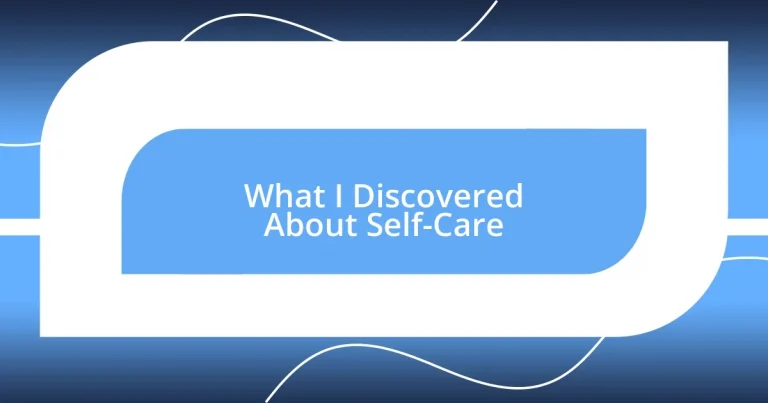Key takeaways:
- Self-care involves a variety of practices that enhance physical, emotional, and mental well-being, including journaling, mindfulness, and connecting with nature.
- Common myths about self-care, such as it being selfish or requiring significant time and money, should be challenged to embrace simple and accessible self-care strategies.
- Building a personalized self-care plan involves self-reflection, flexibility in routines, and regular evaluation to adapt practices based on evolving needs and circumstances.
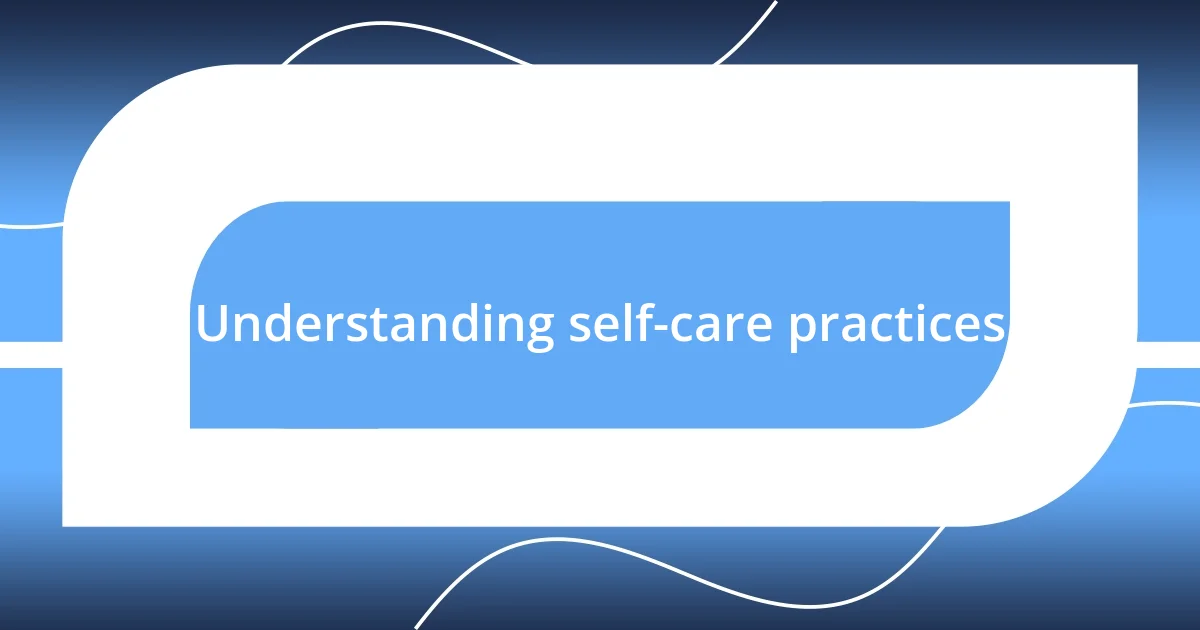
Understanding self-care practices
Self-care practices go beyond the typical bubble bath or a day off work; they encompass a broad spectrum of activities that nurture our physical, emotional, and mental well-being. Personally, I’ve found that my most significant self-care moments occur while I’m journaling or practicing mindfulness. Have you ever set aside time to truly reflect on how you feel? It’s incredible how just putting pen to paper can transform a chaotic mind into a clearer, more peaceful space.
I remember a particularly hectic week when I felt overwhelmed by responsibilities. In those moments, I made it a point to step outside for a walk in nature. The fresh air and the sounds of the leaves rustling made a remarkable difference in my mood. It begs the question: how often do we take the time to step away from our screens and connect with the world around us? Understanding that self-care can be as simple as changing our environment is vital.
Self-care is also about setting boundaries and prioritizing what truly matters in our lives. Over time, I learned to say no to things that drain my energy, which liberated me to say yes to the activities that genuinely uplift my spirit. Have you assessed what brings you joy versus what depletes you recently? This exploration is key to understanding how to cultivate a sustainable self-care routine that nourishes you in the long run.
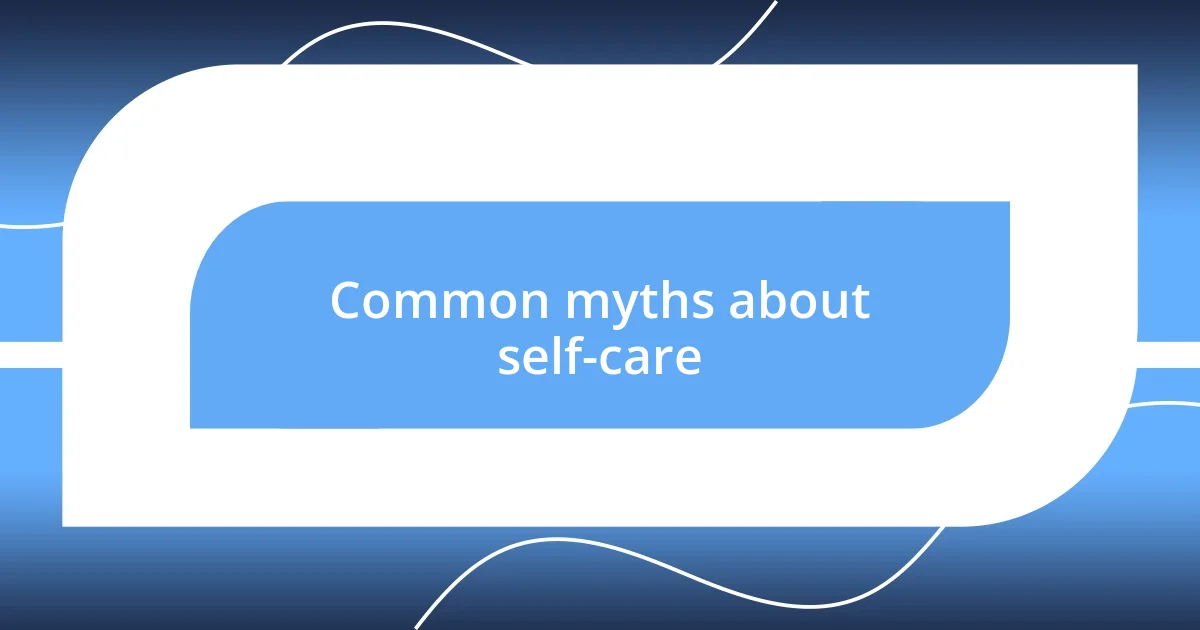
Common myths about self-care
Self-care is often surrounded by misconceptions that can lead people astray. One common myth is that self-care is selfish. I used to believe that taking time for myself meant I was neglecting others, but I’ve learned that nurturing my own well-being enables me to be more present and supportive for those I care about. When I prioritize self-care, I feel energized and ready to engage with my loved ones rather than feeling drained and irritable.
Another prevalent myth is that self-care requires a lot of time or money. From my experience, self-care doesn’t have to be elaborate or expensive. In fact, some of the most powerful self-care practices are accessible and require minimal time investment. Here’s a breakdown of common myths:
- Self-care is selfish: Prioritizing your well-being can enhance your ability to support others.
- Self-care requires money: Simple practices like deep breathing or taking a walk are entirely free.
- Self-care is time-consuming: Even a few minutes of stretching or a quick meditation can yield significant benefits.
- Self-care is a one-time fix: It’s an ongoing journey that requires regular attention and adjustment.
By embracing these insights, I’ve been able to craft a self-care routine that resonates with my needs, proving that it’s not about the quantity of time spent but the quality of actions taken.
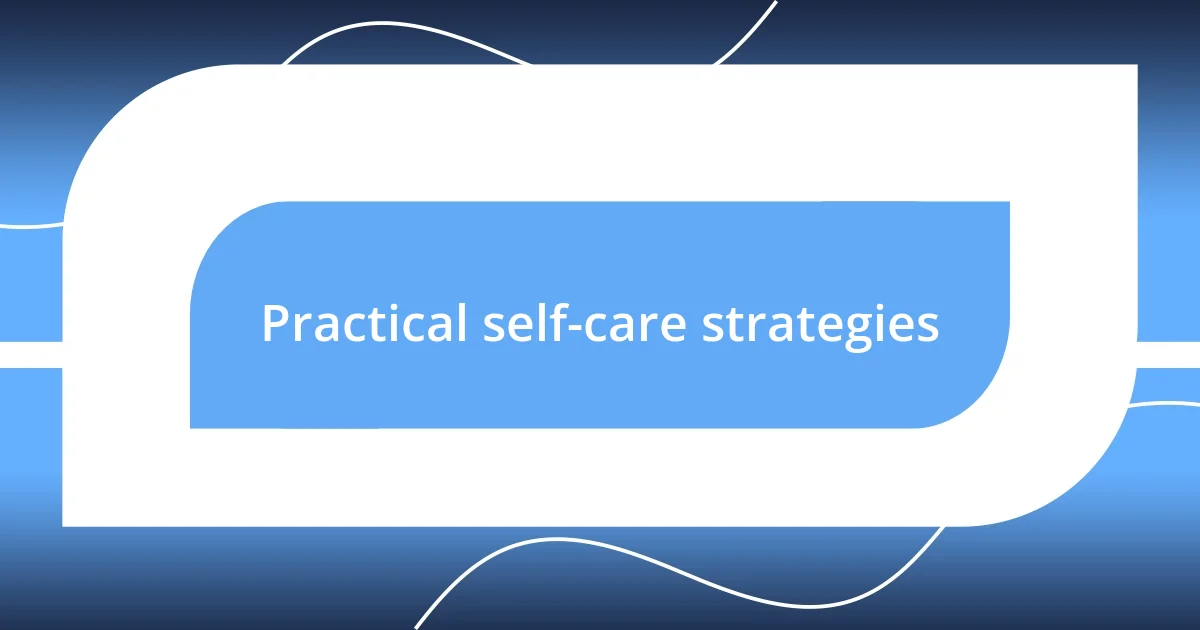
Practical self-care strategies
Self-care strategies come in many forms, and I’ve discovered that the variety is what makes them so effective. For me, creative outlets like painting or playing an instrument provide a powerful release. The immersive experience allows me to express emotions that words sometimes can’t capture. Have you found a hobby that resonates with you? It’s remarkable how engaging in something you love can rejuvenate your spirit and shift your focus away from daily stressors.
In my routine, I’ve adopted a simple morning ritual that has transformed how I start my day. Each morning, I take ten minutes to sit in silence with a warm cup of tea. During this time, I set intentions for the day ahead. This practice grounds me and helps me maintain a positive mindset, which I’ve found profoundly impacts my interactions with others. Just a bit of dedicated time can prepare you for whatever the day brings.
Practicing gratitude has also become a cornerstone of my self-care. Each evening, I take a moment to jot down three things I’m thankful for. Some days, it’s the little things—like a kind word from a friend or a delicious meal—and on others, it’s bigger moments such as reaching a personal goal. This reflection helps cultivate a sense of abundance, reminding me of the positive aspects of life even during challenging times. Have you tried keeping a gratitude journal? You might be surprised at how this practice can shift your perspective.
| Self-Care Strategy | Description |
|---|---|
| Creative Expression | Engaging in activities like painting or music to channel emotions and reduce stress. |
| Morning Ritual | Taking a few quiet moments each morning to set intentions and prepare mentally for the day. |
| Gratitude Practice | Journaling gratitude each evening to foster a positive mindset and recognize daily blessings. |
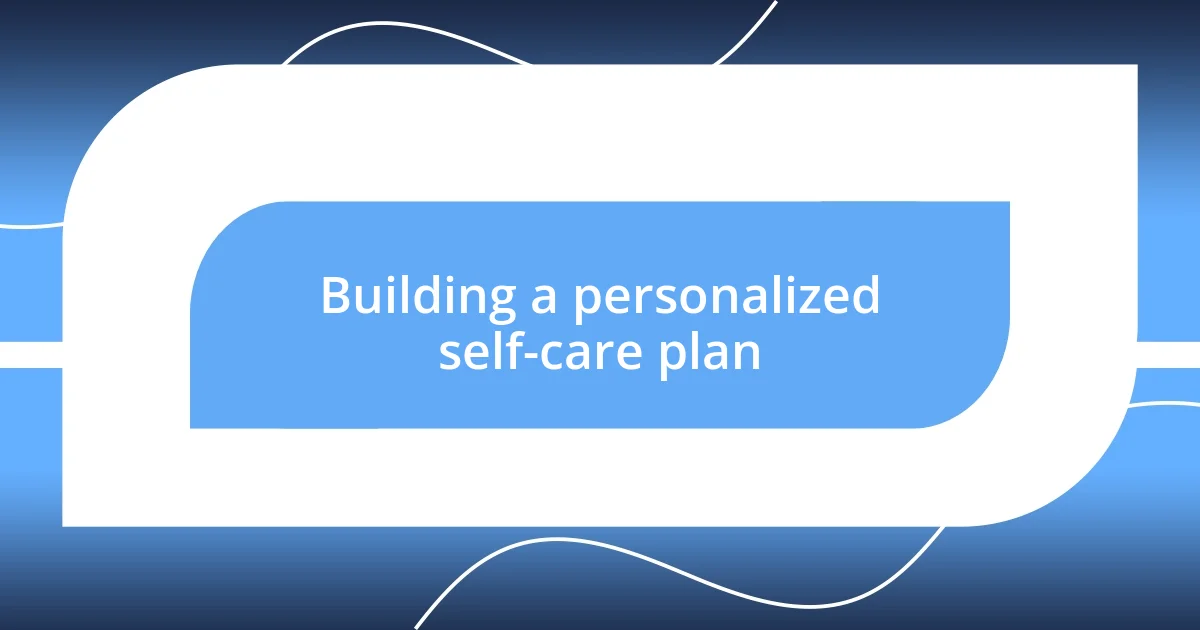
Building a personalized self-care plan
Building a personalized self-care plan starts with self-reflection. I remember sitting down one afternoon, feeling overwhelmed, and realizing I had no idea what I truly needed. Asking myself questions like, “What do I enjoy?” or “What makes me feel rejuvenated?” helped me identify activities that not only sparked joy but also nourished my soul.
As I mapped out my self-care routine, I recognized that it had to fit my lifestyle. Initially, I thought about scheduling long spa days or elaborate retreats, but I quickly learned that the simplicity of a five-minute breathing exercise during a busy workday was far more effective for me. Have you thought about how small adjustments in your daily routine could create a more balanced life?
Evaluating and revising my plan regularly was also a game-changer. I’d check in with myself weekly, reflecting on what worked and what didn’t. Some weeks, my exercise routine might feel invigorating, while others, it felt like a chore. It’s all about flexibility; understanding that self-care is not a linear journey has allowed me to be kinder to myself and adapt as I grow. What aspects of your self-care plan could use a little reshaping?
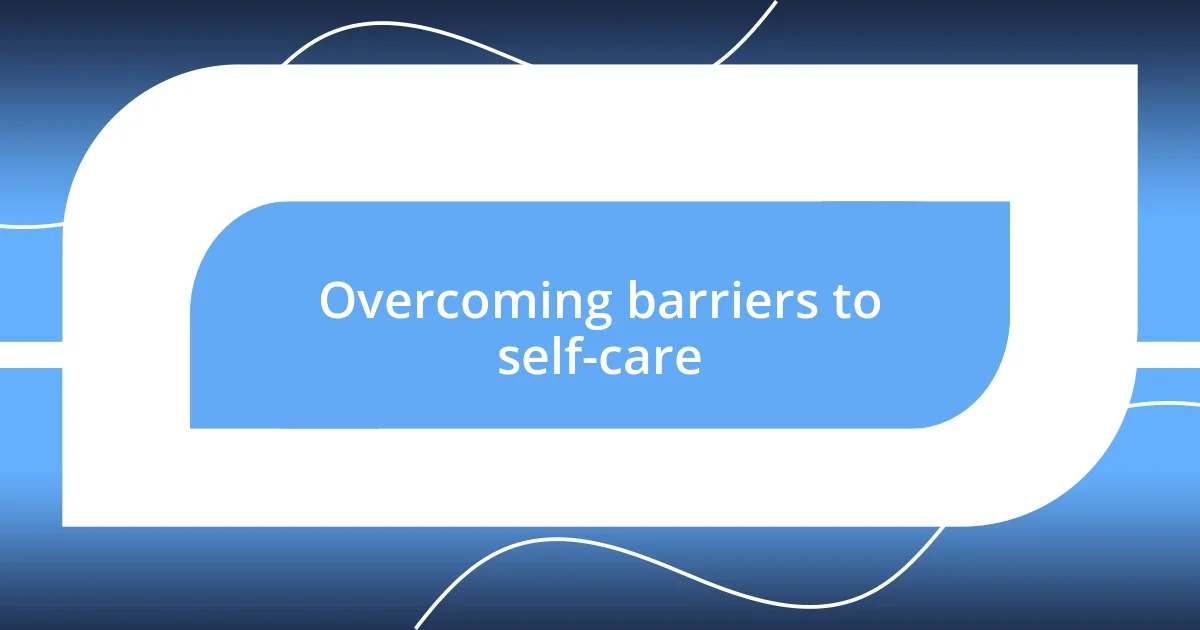
Overcoming barriers to self-care
It’s interesting how our minds can become the biggest barriers to self-care. I’ve found that guilt often creeps in whenever I carve out time for myself. Whether it’s feeling selfish for skipping chores or worrying about what others might think, those feelings can be overwhelming. Have you ever felt that way? I realized I had to remind myself that self-care isn’t just a luxury; it’s essential, not only for my well-being but also for how I can show up for others.
Another significant hurdle I encountered was the idea that self-care should be extravagant to be effective. I once assumed that taking care of myself meant indulging in spa treatments or weekend getaways, which just weren’t realistic for my lifestyle. Then it dawned on me: simple pleasures like a quiet walk in the park or savoring a cup of coffee can be just as rejuvenating. Breaking it down to those small moments has not only alleviated pressure but has also enriched my daily life in unexpected ways.
Time constraints are often the cause for neglecting self-care, don’t you think? I remember juggling work and family responsibilities, leading me to think I simply didn’t have the bandwidth to prioritize myself. Yet, I eventually realized that integrating self-care into my daily routine—like a mindful minute between tasks or bedtime stretches—created pockets of peace in my chaotic schedule. It was a small shift, but the impact has been profound. How might you squeeze a bit of self-care into your busy day?
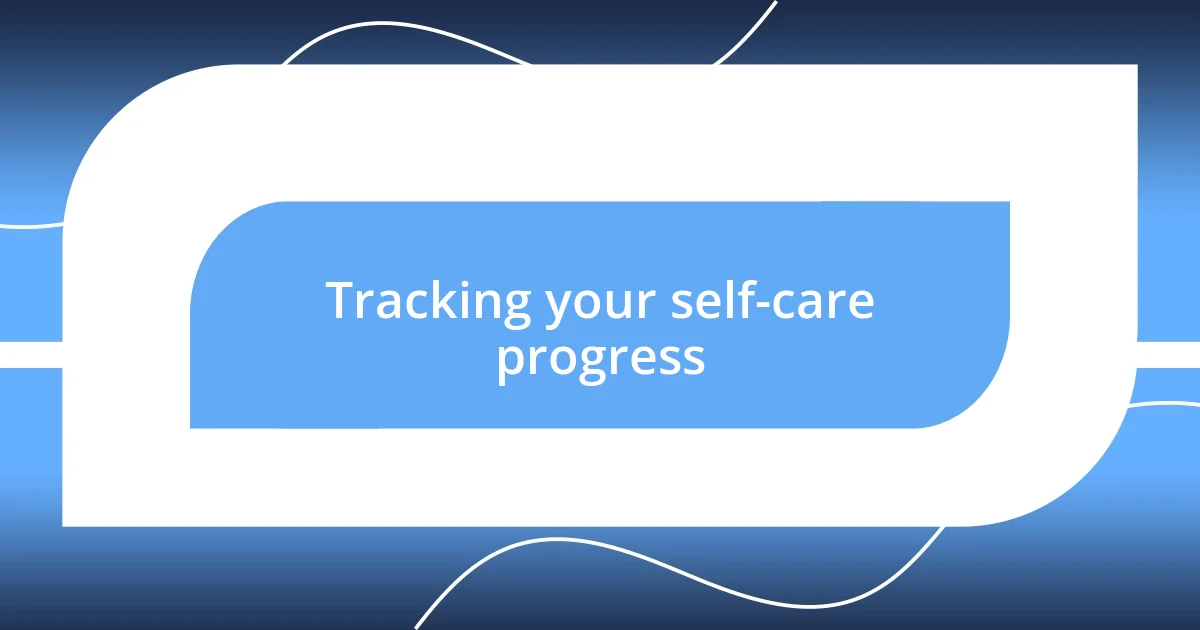
Tracking your self-care progress
Tracking your self-care progress can be a revealing journey. I remember starting a simple journal where each day I noted down my self-care activities and how I felt afterward. It was eye-opening to look back and see which practices genuinely lifted my spirits and which ones felt like just another task on my to-do list. Have you ever considered how a small note could shift your perspective on what truly nourishes you?
As weeks passed, I developed a habit of reviewing my entries at the end of each month. Reflecting on my experiences gave me clarity about what was sustainable and what needed tweaking. I found myself excited about the changes I could make based on this honest self-assessment. Can you imagine the insights you might uncover by simply tracking your daily actions?
One compelling breakthrough for me was realizing that self-care isn’t about rigidly following a set plan. It’s about attuning to my evolving needs. For instance, there were weeks when meditation brought me peace, and others when it felt like pulling teeth. Adjusting my focus helped me appreciate the freedom in my wellness journey. Have you allowed yourself the grace to adapt your self-care routine as your circumstances change?












